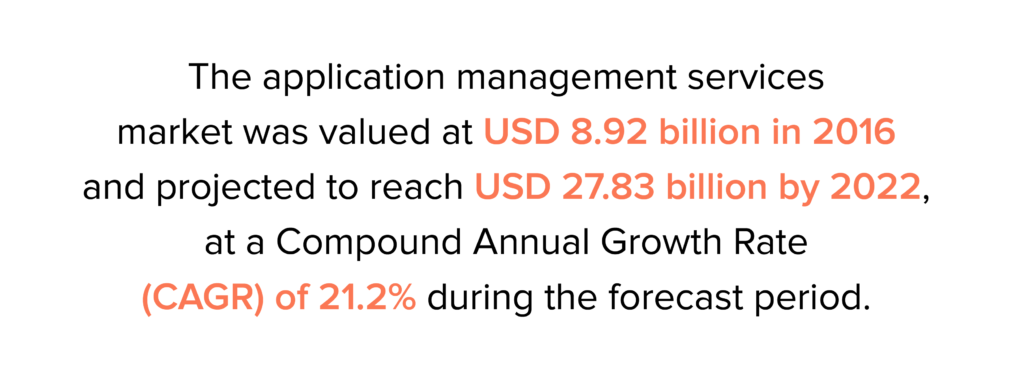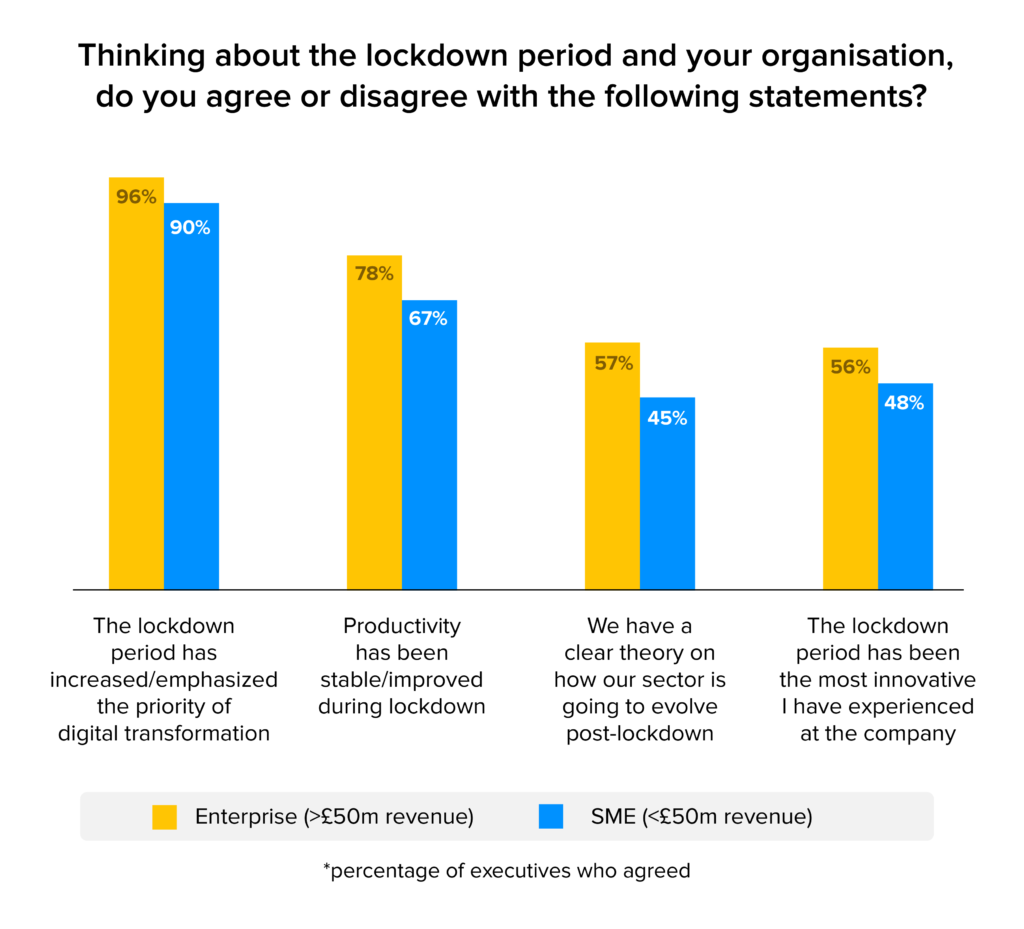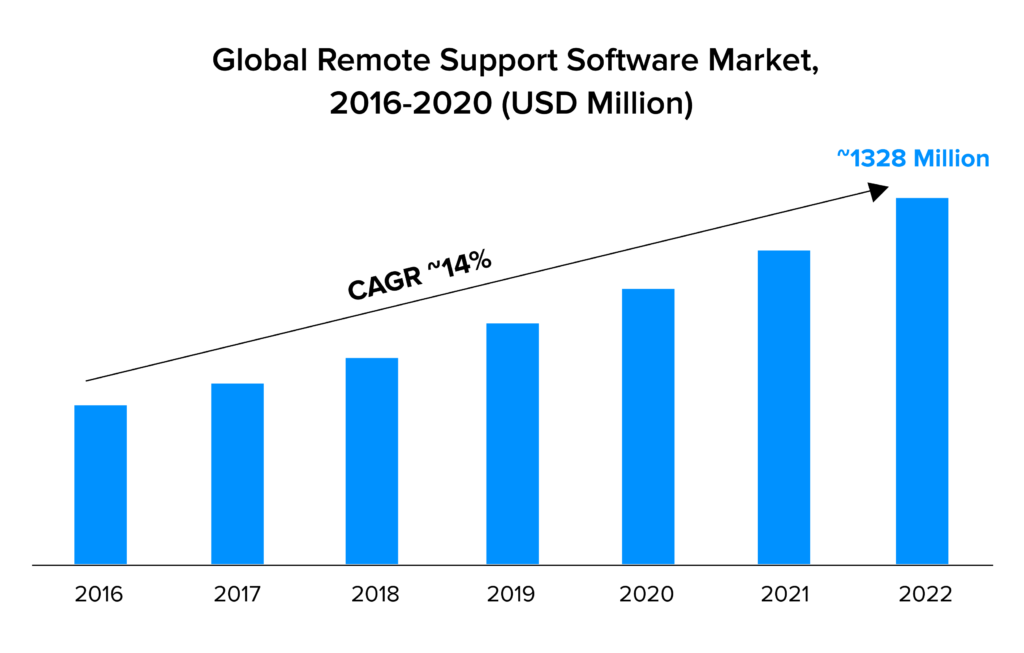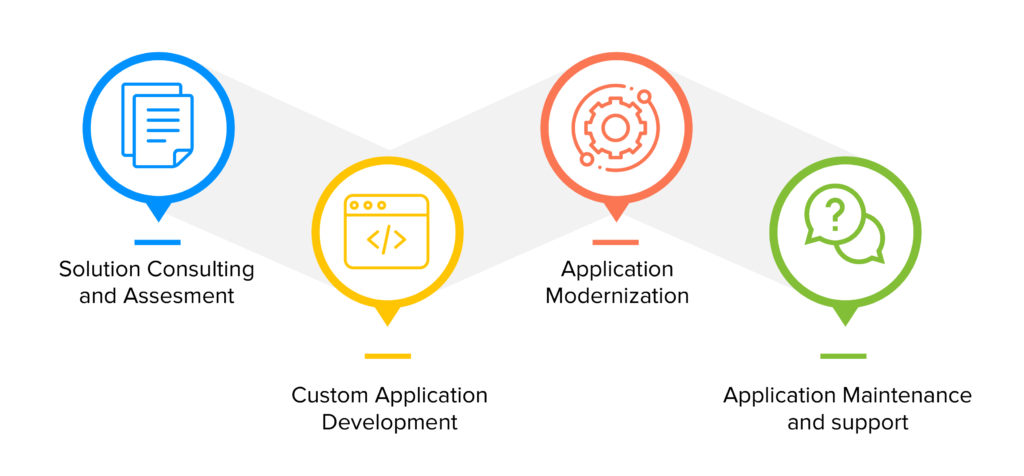How Can Enterprises Pilot the New Normal with Next-Gen Applications
Remote working, physical distancing, travel limitations, and the psychological effect of isolation have together changed stakeholders’ behaviors in every organization while creating unexpected challenges along the way. This pandemic has not just disrupted everything once denoted normal but has also been forcing enterprises to navigate the recovery period and develop a new normal for the post-crisis era.
Even amidst the clear need for digital transformation, enterprises are grappling to remain competitive in a world filled with nimble startups. These enterprises were once dependent on their IT models as a key to a competitive edge. Now, however, the same IT cores have made it difficult for them to adopt a new normal centered around flexibility, speed, and efficiency.
With being nimble now accounted as the only way to survive and scale in the COVID-19 world, enterprises have turned their focus on the development of next gen apps.
Table Of Content
- The Need for Next Gen Apps
- What Does Next generation application development Mean for Enterprises? Speed, Efficiency, and Flexibility
- Key Transformation Areas for Enterprises
- The Best ADM Approaches for the Creation of New Normal Enterprise Applications
- Schedule a Discussion
The Need for Next Gen Apps

Businesses need apps that will be able to adapt to changing demands and scale to meet customers’ and employees’ needs in real-time. An enterprise application development company by building next-gen apps based on business understanding and customers’ requirements gives enterprises a platform to transform digitally.
Next generation mobile apps and other software help enterprises:
- Lower the time to market when meeting the changes in customers’ needs.
- Lower product complexity by utilizing a cross-platform, scalable ecosystem.
- Make smarter business decisions through analytics backed insights.
What Does Next Generation Application Development Mean for Enterprises? Speed, Efficiency, and Flexibility
The need of the business hour for enterprises, as we noted before, is to look for next generation application management services. This new normal in enterprise software revolves around a trio – Efficiency, Speed, and Flexibility.
Speed – Pre-COVID, release cycles came with months-long completion time. Now, with customers’ needs changing by the minute, enterprises don’t have the leverage of taking up months for deployment. There is no guarantee of a problem staying a problem by the end of those months. The new normal enterprise will have to bring in agile methodology in its application development and maintenance process to offer its stakeholders value in real-time.
Efficiency – The success of every nimble enterprise lies in automation, a well-planned business integration, and the adoption of agile methodologies. And all of this can be achieved through practices like: the integration of AI in mobile apps, re-prioritization of business processes, and weeding out unnecessary feature sets.
Flexibility – Zero downtime has become a success mantra. But its adoption is a lot easier written or said than done. In order to become truly flexible, enterprises must modernize or replace their outdated applications. However, letting go of the legacy system is one of the biggest digital transformation issues.
What enterprises need is a next generation application maintenance program that would make proper use of the modernization spend while enabling digital transformation.
Before we get down to the nitty-gritty of what that next-gen application would look like, let us look at the areas that enterprises would have to work on to compete within themselves and with the startups flooding in the business ecosystems.
Key Transformation Areas for Enterprises
The best thing about enterprises is that they understand how COVID-19 would change them – on some grounds, better than their startups’ counterparts.

The speed of automation will expedite
The automation of key processes and routine tasks has remained at the center of business development for some time now. This need for task and process automation is not new. Back in 2017, McKinsey & Company forecasted that 30 percent of key tasks across industries will get automated by 2030. “Before the pandemic, automation was looked upon as a way to boost efficiency while cutting costs,” said H.I. Executive Consulting. “With social distancing directives likely to stay in place for a while, more and more businesses are accelerating their automation efforts in order to reduce close human contact to a minimum, free up employees to manage crisis response and focus on providing essential services.”
The movement towards remote digital service
The new normal for business after covid will be organizations changing their support and service delivery plans to meet the digital reliance of their employees and customers.
Here are some examples of what a remote digital service looks like.
The digital-powered Russian bank Tinkoff created a cloud-based call center with several freelance employees. The bank focuses completely on virtual servicing. To date, they have expanded into a team of 14,000 call center operators of which 6,000 of them make an average of 500,000 customer calls every day from homes. The bank’s cost of managing and training operators gets offset by the savings made from rental offices and equipment.
In the telecommunication industry, companies have started launching digital-only offerings that redefine customer experiences and gather considerable attraction. The USP of these services lies in customers signing themselves and moreover with more than 80% of customer-care activities being conducted online. In this digital-first model, online referral act as the biggest source for customer acquisition – estimated to be 15% of the total sales.
The success examples are prevalent across multiple industries. This has turned remote service into a trend that has a high-profit potential.

Supply Chain Disruption May Continue
Global lockdowns have resulted in a massive scale of supply chain disruption. Back in February, Fiat Chrysler Automobiles NV stopped production in their Serbia factory for they weren’t able to obtain automobile manufacturing parts from China.
The majority of the enterprises understand the manufacturing and delivery process of their Tier 1 suppliers while having little visibility on further the line. The business need is to make the supply chain resilient for the post-COVID period. And in order to do that, enterprises would have to:
- develop strong backend infrastructure – possibly by combining blockchain and supply chain processes
- remove the dependency from paper-based processes
- share data with suppliers for gaining manufacturing stages visibility.
Partnerships will become collaborative and lean
Enterprises can meet the changing partners and vendors’ preferences by shifting to a more collaborative and flexible set of partnerships. These partnerships can be multi-form. Example: An IT consultancy firm could work with remote vendors to decrease their office and travel cost. There can also be enterprises providing agreements with their vendors for long-term opportunities. For example, how Alibaba supports SME suppliers with an extended line of credit.
As a part of the new normal for marketplace, we are seeing partnerships brewing on the basis of an understanding of customer needs, wherein both the partners can mix knowledge and create value. For example, recently, WhatsApp started enabling its customers to directly connect with brands and make purchases through a simplified mobile experience on WhatsApp.
Management systems of a new model
Met with the unsurity of the new reality, enterprises have started looking for ways of adopting virtual management systems in enterprise application development services.
For effectively responding to a fast-changing environment, businesses will consider making use of advanced analytics tools, automation, and digitalized processes to meet customer demand fluctuations in semi real-time. We can also envision enterprise application development solutions being built on human-technology interactions which would help businesses collect insights for IT-driven productivity rise.
To meet with the changes that a post-COVID world would pose, businesses would have to take a modernized approach – one that would help them become cognitive. While this can be achieved through the creation of new-age technologies backed next generation mobile applications services, it would need enterprises to get back to their legacy systems.
Here are some of the application development and maintenance approaches that we have been offering to enterprises coming to us seeking digital transformation consultancy.
The Best ADM Approaches for the Creation of New Normal Enterprise Applications

Optimizing the current IT systems
Enterprises can optimize their present IT systems with modern approaches and tools to cut costs and heighten efficiency. We advise organizations to make use of AI and automation capabilities for ensuring quality and following DevOps steps to lower the development cycle.
By deploying new-generation capabilities and features around existing systems enterprises will be able to innovate and keep their competitive edge – even when they are not prepared for complete cloud transformation. They can attain easier access and modification of the legacy systems through the use of technologies like containers, API integrations, and microservices.
Gather data and convert it into an actionable product in a minimal time range
When we build enterprise applications, we focus on benefiting from cloud-native, digital-first technologies to deliver growth at speed. Deploying speed-focused innovation abilities are generally backed with an MVP, small feedback loop, test-driven development, and a fail-fast approach.
The intent of this approach is to help enterprises take key business decisions and turn them into products that their stakeholders need in as close as real-time.
Schedule a Discussion
Preparing your business for a post-COVID era can be full of doubts and challenges. The time we are presently operating in is one that we have never witnessed before. But the only way to get out of it as an industry leader is to take the nimble approach and focus on making enterprise mobile app development next-gen. We are here to help. Schedule a consultation with our enterprise-focused team to sail through the unprecedented waters.

strategies your digital product..



